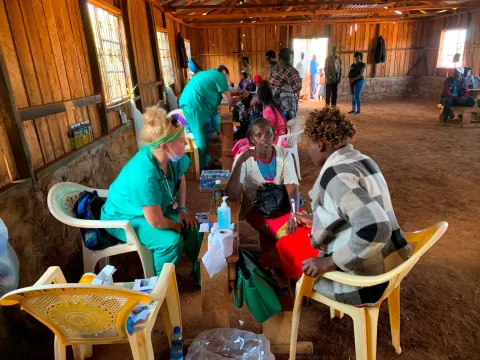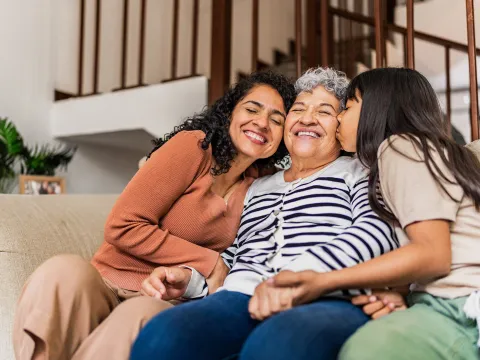- UChicago Medicine AdventHealth

Choose the health content that’s right for you, and get it delivered right in your inbox.
There's a saying we live by on mission trips — embrace the mystery. No matter how well you plan for things, something will happen that requires a quick change. How you react to those changes makes all the difference.
We set up our clinic in a school that was new to us this year, and over the course of the day, we treated 208 children and 173 adults, for a total of 381 patients. Michael Thiede and the crew began to paint a building out back, and a father of one of the students at the school joined them to help. He worked for a little bit before leaving without a word, and then came back with his two older sons. Together, they were able to paint the entire building.
The triage team got to work taking vital signs, and soon they found an older woman that was hypotensive. She had an extremely low heartbeat of 52 and her blood pressure was 70/40. She said she felt like she was going to faint. The team looked for a place where she could lie down, so they took her to the obstetrics area, which was the only room in the school with air conditioning. They started an IV to give her some fluids. The woman rested for a bit and once she felt better, her only concern was where her purse was. We found the purse, gave her some medication and diabetes education and off she went.
At the end of the day, a woman came running into one of the provider areas and ran up to our doctors. Her 5-year-old daughter was having a febrile seizure. Tommy Manion, a paramedic from the triage team, picked her up and carried her to the air-conditioned room. She was extremely warm, but the team couldn't take her temperature because of the seizure she was having.
Our pediatrician, Dr. Mary Lewis, stripped her down and Manion started an IV. Thankfully, the seizures stopped before the 15-minute critical mark. Dr. Rema Johnson, an emergency medicine doctor, assisted and Heidie Cruz translated to the mother and father, who were clearly distraught because their daughter, whose name was Sonia, had never had a seizure before. Katherine Lluen-Nunez came from the pharmacy with medications and administered them and Ismael Gama held up the IV bag.
Once little Sonia woke up, the team gave her some medicine and made a toy for her by blowing up a purple examination glove as a balloon. Sonia took the balloon and hugged it.
In this country, for a febrile seizure like this one, the normal protocol is to take the child to the hospital. But our doctors felt confident that this wasn't necessary. Instead, we asked the mother that she bring Sonia to our next clinic in another town about an hour away. We offered to hire her transportation to get there — and everyone in the room offered to pay for it. She accepted $20 and we are hopeful that she will come to the clinic tomorrow.
On the way home, our bus crossed over an extremely narrow bridge. There were less than six inches on either side of the bus, so we drove very slowly and carefully. Another bridge was nearby, but cows were crossing that bridge, so this was the fastest option.
It was an old bridge, so it was no wonder that we hit a spike and punctured our tire. There are double sets of tires in the back and one of those tires was now flat. Our bus driver, Edwin, asked if we could stop at a local shop on the way back to have it fixed. We stopped at the auto shop, got everyone off the bus, and the tire was fixed in less than 10 minutes for a $3 fee. We clarified… $300? Nope. Just $3.
At our team meeting that night, we talked about the events of the day, how people often spend so much time worrying about the details of life when really all we need to do is let go and let God. Little did we realize in the morning that an air-conditioned room we viewed as a luxury would serve as a life-saving measure by the afternoon. That a little girl having a seizure would come at the most perfect time of day when the clinic was winding down. That we would have a flat tire but make it home in time to watch the most amazing sunset.
"Looking back at our day, it's easy to see that God's fingerprints are all over each moment," said Dr. Johnson. "The sunset was His way of telling us He had us in his palm all day long."



